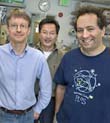 |
Some Gene Binding
May Mean Nothing
|
|
|
|
 |
 |
|
|
| From l-r, Biggin, Li, and Eisen |
|
|
|
Biologists are developing ever more sophisticated means to characterize molecular interactions in living systems. But many of these interactions may be functionally irrelevant, says a new study in the online journal PLoS Biology, led by Michael Eisen, Mark Biggin, Xiao-Yong Li, and Stewart MacArthur of Berkeley Lab’s Genomics Division. Transcription factors that choreograph early development in the fruit fly bind to a surprisingly wide array of genes, but much of this binding has no effect on gene expression, the researchers found. This story is available here, and will also appear in the forthcoming edition of Science@Berkeley Lab (SABL). To get the latest SABL stories hot off the cyber press, subscribe to an RSS feed of the publication.
Nanoplankton May Hold
Key to Animal Origins
|
|
|
|
 |
 |
|
|
| Choanoflagellates |
|
|
|
The newly sequenced genome of a one-celled planktonic marine organism, reported yesterday in the journal Nature, is already telling scientists about the evolutionary changes that accompanied the jump from one-celled life forms to multicellular animals like ourselves. In the study, Daniel Rokhsar, with Berkeley Lab’s Genomics Division, and UC Berkeley biologist Nicole King, present their first draft of a choanoflagellates genome called Monosiga brevicollis and their comparisons with the genes of multicellular animals. These two groups shared a common ancestor between 600 million and a billion years ago and provide a key to understanding the origins and evolution of animals. Full story.
Superconducting Power
Lines Could Reduce Waste
Imagine a world where electricity was virtually free and the means to store it limitless. Berkeley Lab materials scientist Alessandra Lanzara says this can be done by restringing the power grid with high temperature superconductors. "There is a lot of waste getting electricity from its production site to your home because materials that carry a current have resistivity," Lanzara says. Superconductors, on the other hand, can transmit a current without loss when chilled below a critical temperature. Power lines made of superconductors, Lanzara argues, could retain the energy now lost to waste. Full story.

|
 |

